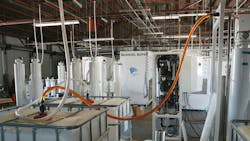Biodiesel Company Expands Capability in California
Springboard Biodiesel announced that it will officially enter a new phase of biodiesel production with the grand opening of its model processing facility in Chico, California on May 1.
The Calif.- based, clean-tech manufacturer ‘s new plant is a zero-waste biodiesel production plant that is designed for low-cost production of multiple feedstocks. Capable of producing up to 1,500 gallons per day, the facility currently processes locally collected UCO feedstock into ASTM-grade B-100 biodiesel with a low carbon intensity.
Until now, the company has focused exclusively on manufacturing small-scale, standalone biodiesel production systems sold under the BioPro and SpringPro brands. The new production facility Springboard will produce l 1,000 gallons per day of ASTM-D6751 grade biodiesel.
Working in concert with the company’s used cooking oil (UCO) collection partner, Smart Alternative Fuels, based in Redding, Calif., Springboard will be processing locally collected UCO into ASTM-grade biodiesel.
The market for biodiesel is increasing as fleet managers try to better manage their carbon emissions without expensive equipment changes.
“Using biodiesel made from UCO will reduce the driver’s CO2 emissions by as much as 90%, while simultaneously reducing particulate matter by 50%, and because we are able to price our biodiesel to compete with diesel, these are ‘free’ benefits of incorporating biodiesel into your fleet management logistics, ”said Springboard CEO, Mark Roberts. One of the benefits is that no engine conversion is necessary for diesel vehicles to use the fuel. Furthermore, Roberts points out, that “ due to the superior lubricity present in biodiesel, it burns with less wear than other fuels and can actually smooth out louder engines.”
The California Energy Commission (CEC) played a significant role in the development of this "first in the state" small-scale biodiesel production facility. The CEC awarded a grant through its Alternative and Renewable Fuel and Vehicle Technology program to assist in the development with the intention that this facility will serve as a model to be replicated in other communities. The groups goal is to reduce transportation greenhouse gas emissions (GHG), through the use of biodiesel vs. diesel using small-scale production plants throughout the state rather than large refineries, thus reducing the carbon intensity by using local by-product feedstock and local distribution.
